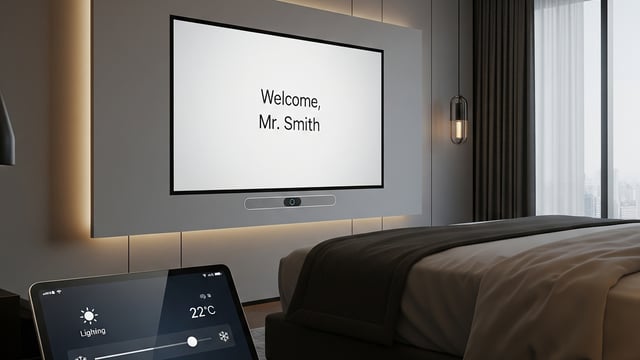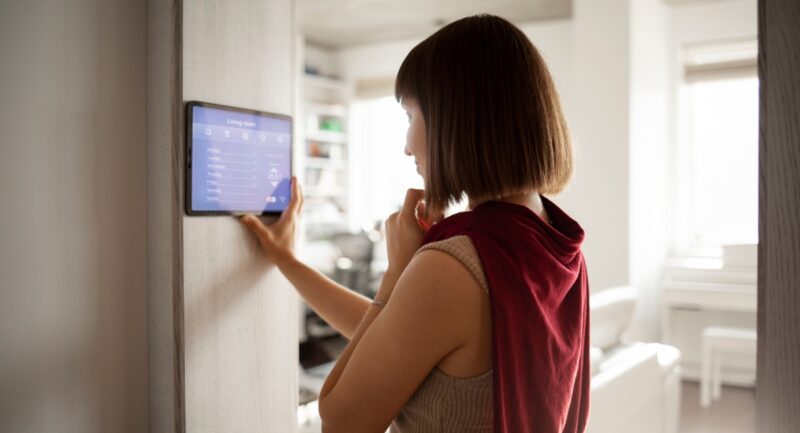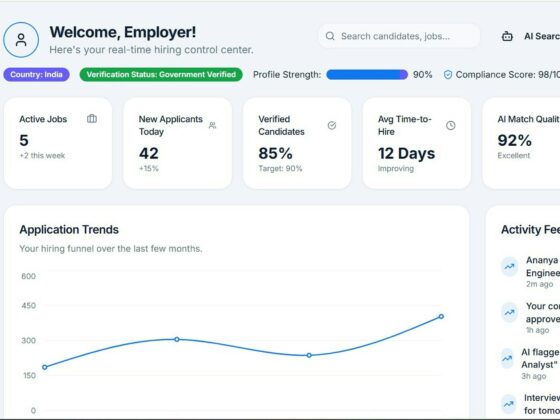
The physical spaces that shape a hotel guest’s experience – lobbies, rooms, and dining areas – are now being reimagined with technology at its core.
Instead of cleaning staff checking a physical log to see which rooms are occupied, they can glance at a colored light outside the door. At the buffet, there’s no need to constantly swap out menu cards, the digital labels update in real time. In the gift shop, guests can tap their phone against a shelf label and check out instantly.
Guest loyalty now hinges on how well hotels can meet these rising expectations with technology that mirrors the ease of their own connected lifestyles. Research projected that in 2025, 65% of hotel guests will prefer hotels with smart room features,a benchmark that hotels today should be striving to meet, if not exceed.
For hospitality CTOs, CIOs, and VPs of IT, the competitive edge now lies in how a guest’s experience is enhanced digitally by embedding subtle tools to make service faster, more intuitive, and sustainable.
That’s a transformation worth investing in, and major brands are taking note. Marriott, for example, has made significant investments in customer-facing technology, such as a major re-platforming of core systems and upgrades to its app to create more user–friendly digital interfaces for guests and associates.
When the right technology is in place to keep operations running smoothly, staff can spend more time delivering the personal, attentive service that makes hospitality so special.
Upgrading Room Tech
An overlooked opportunity for guest experience is room signage. Rather than static plaques or door hangers outside guest rooms, smart displays like SOLUM’s Newton digital labels, for example, can indicate occupancy status, service requests, or privacy preferences in real time. Multicolor indicators show housekeeping and maintenance teams whether a room is vacant, needs service, or should not be disturbed, without having to knock. Staff can operate more efficiently, all while maintaining the guest’s privacy and comfort.
Inside the room, there’s an opportunity to rethink another set of hotel staples: brochures, menus, and even surfaces themselves as intelligent, guest-centric communication hubs.
High resolution digital displays can replace these outdated printed materials with real-time, context-aware content such as spa offerings, dining availability, resort activities, or even weather conditions. These displays also reduce clutter and printing costs, while delivering a customized experience that evolves during the guest’s stay.
This shift aligns with broader industry trends. For example, Hilton’s Digital Key lets guests unlock their rooms, check in, and members can choose their upgraded room location all from their own app. Disney also introduced “Hey Disney!”, a custom voice experience available in hotel rooms that allows guests to order room items and get information, all through Amazon Echo devices. These are the ways hotels are embedding tech into the physical space to bring confidence and convenience to the guest experience.
Enhancing Guest Clarity in Dining Areas
Restaurants and buffet areas are another area where smart signage is proving its value and solving long-standing guest frustrations. In high-traffic buffet settings, it can be difficult to keep information consistent, which in return makes guests encounter incomplete dish descriptions, missing allergy information, or conflicting communication about what is being served. This can detract from the overall dining experience.
With digital labels, hotels can automatically update and provide clear information about new dishes, allergens, or chef recommendations, giving guests greater confidence in their choices and ensuring dietary needs are respected without needing to track down staff.
For table service, smart displays can switch between menus, specials, and wine lists, elevating the dining experience and improving service flexibility. On the operations side, smart tags reduce waste and labor associated with printing and replacing paper signs for every menu change or special event.
Retail-Inspired Intelligence for Hotel Shops
It can be challenging for guests to navigate hotel gift shops and lobby markets when pricing or product information isn’t clearly presented, which leads to missed purchase opportunities and lost revenue. However, hotels have the potential to turn these underutilized spaces into stronger revenue drivers.
Taking inspiration from retail giants like Walmart and Whole Foods, hotels can leverage Electronic Shelf Labels (ESLs) and shelf-level intelligence. These technologies allow back-of-house teams to gain live inventory visibility, allowing them to manage pricing remotely and respond faster to demand spikes.
This reduces manual inventory tracking and ensures that popular products stay in stock with a minimal staffing burden. By adopting smart shelving technology, hotels can transform these spaces into efficient, self-service micro-retail experiences.
Building on that foundation, digital pricing labels paired with near field communication (NFC), a wireless technology that allows two nearby devices to exchange data instantly over short distances, can enable guests to tap their phones for product info and contactless payments.
Today’s guests arrive with new expectations shaped by their digital-first lives. However, they still value the high-touch service the hospitality industry is known for. Now, high-touch doesn’t have to mean high-effort. These tools allow teams to deliver service that’s faster, and more personalized, all without sacrificing the human element that defines hospitality. That’s a transformation worth investing in.








